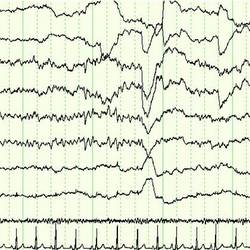
At the turn of the century, Hrayr Attarian, MD, associate professor in the Ken and Ruth Davee Department of Neurology, began to dream of a career in sleep research.
Twelve years later, working in the Circadian Rhythms and Sleep Research Laboratory at Northwestern University Feinberg School of Medicine, he finds himself investigating sleep disorders in pregnant women, individuals with multiple sclerosis, and more. One of his major inquiries revolves around the efficacy of medications used in treating partial arousals – sleepwalking, sleep terror, and confusional arousals.
“We have been treating this spectrum of disorders with medications such as clonazepam, imipramine, and clomipramine, however, there are no publications that look at the efficacy of these drugs,” he said. “Our study will look at a large cohort of adults with this condition and see if these medications are even beneficial. The eventual paper could define state of the art treatment options.”
Men Vs. Women
Throughout his career, Attarian’s investigations have become deeply-rooted in the role that differences in male and female brains might play in sleep disorders. Even the hormonal differences throughout a woman’s life present a unique set of challenges, resulting in women taking two times as long to be properly diagnosed with sleep apnea. Women are also more likely to be misdiagnosed as having depression instead of a sleep disorder.
An aging population has meant that most sleep research being conducted today is focusing on post-menopausal women. The issue, Attarian says, is that very little investigation is done regarding sleep issues of the average adult female. Add to that the hesitation in studying pregnant women, and you’re left with a large segment of the female population where few clear answers exist.

And one of Attarian’s pending publications refutes a longstanding conclusion regarding an issue unique to women. Although no one knows why pregnant women have higher incidences of restless leg syndrome (RLS) – the uncontrollable urge to move one’s legs to relieve crawling, tingling, or burning sensations – one of the prevailing theories was that hormonal changes, specifically a rise in estrogen, was to blame.
“Estrogen levels in pregnancy are long thought to be the cause of RLS and we demonstrated that estrogen containing pills like those used for contraception are not increasing the risk of RLS,” Attarian said. “Therefore, estrogen levels alone cannot explain the increased risk of RLS in pregnancy.”
The conclusion leaves researchers looking for other potential causes for the spike in RLS during pregnancy, a condition that typically peaks in the third trimester and disappears altogether by the time of delivery or shortly thereafter. Other than massage and making sure iron stores in the blood are at acceptable levels, no treatment for RLS during pregnancy exists.
“The next step is to carefully assess pregnant patients with RLS for factors such as iron stores, genetic predisposition, and the effect of other hormones to try and identify the culprit,” Attarian said. It’s research he plans to pursue in the near future.
MS Research
Meanwhile, Attarian continues to research sleep disorders in individuals with multiple sclerosis (MS). While fatigue is experienced by most patients with MS, no examination of circadian rhythm abnormalities in MS patients or the relationship of fatigue to circadian rhythms had been done until 2004. The conclusion of that study outlined a significant correlation between fatigue in MS patients and disrupted sleep and led Attarian to begin investigating the potential reasons for these sleep abnormalities. He is currently screening MS patients with fatigue for apnea to see if treatment for the sleep disorder improves their levels of exhaustion.






